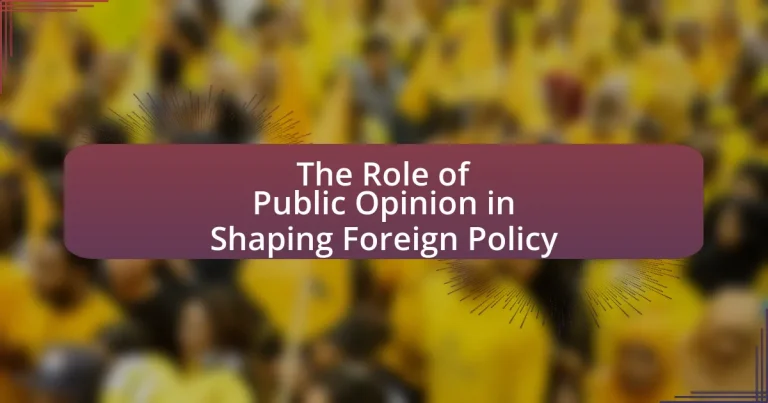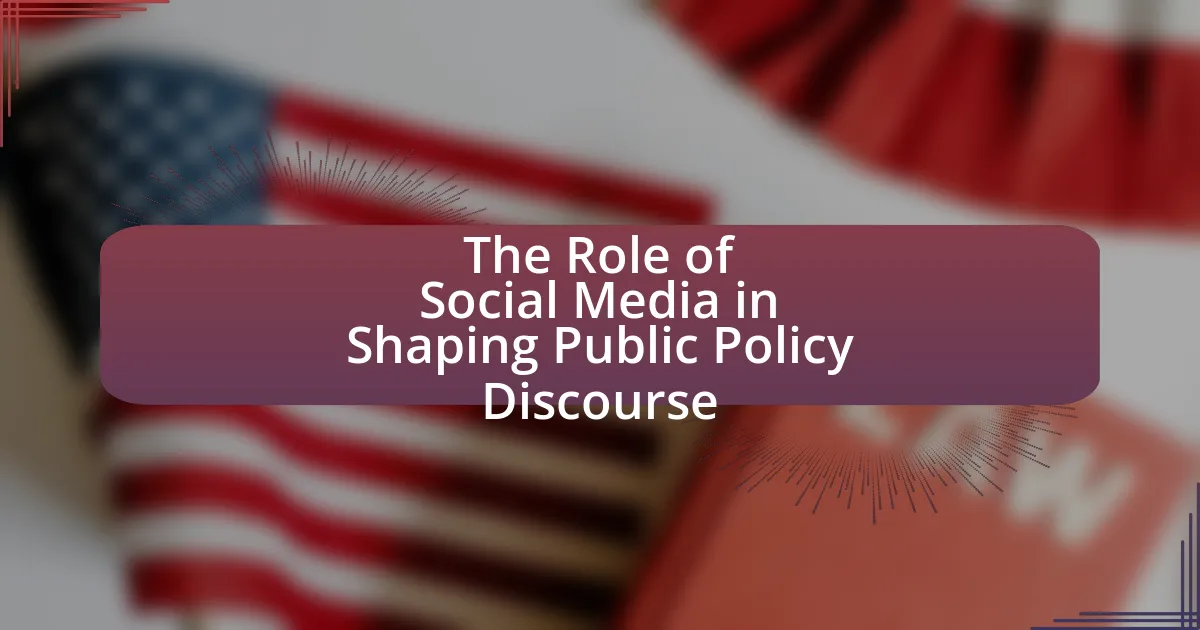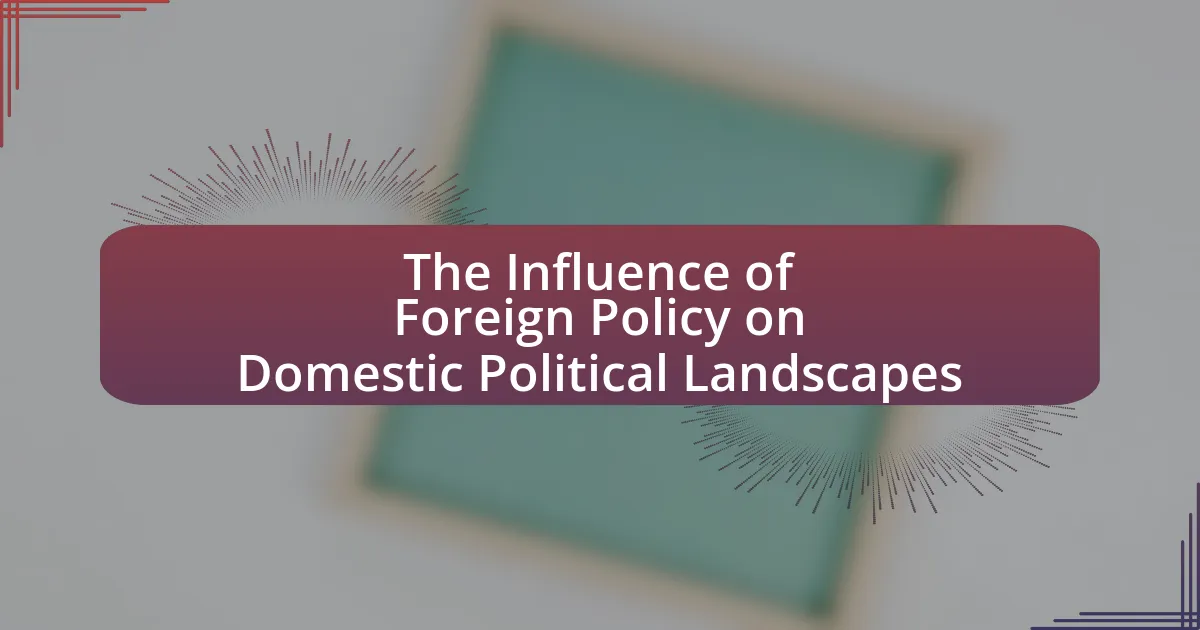Public opinion is a critical factor in shaping foreign policy, influencing government decisions and actions in democratic nations. Policymakers often respond to public sentiment to maintain political support, as evidenced by historical events such as the Vietnam War and the Iraq War, where shifts in public opinion led to significant changes in U.S. foreign policy. The article explores the mechanisms for measuring public opinion, the challenges it presents to policymakers, and the role of media and social networks in shaping perceptions. Additionally, it discusses how public opinion interacts with political ideology and national security, ultimately highlighting the implications for future foreign policy decisions and the importance of engaging with public sentiment effectively.
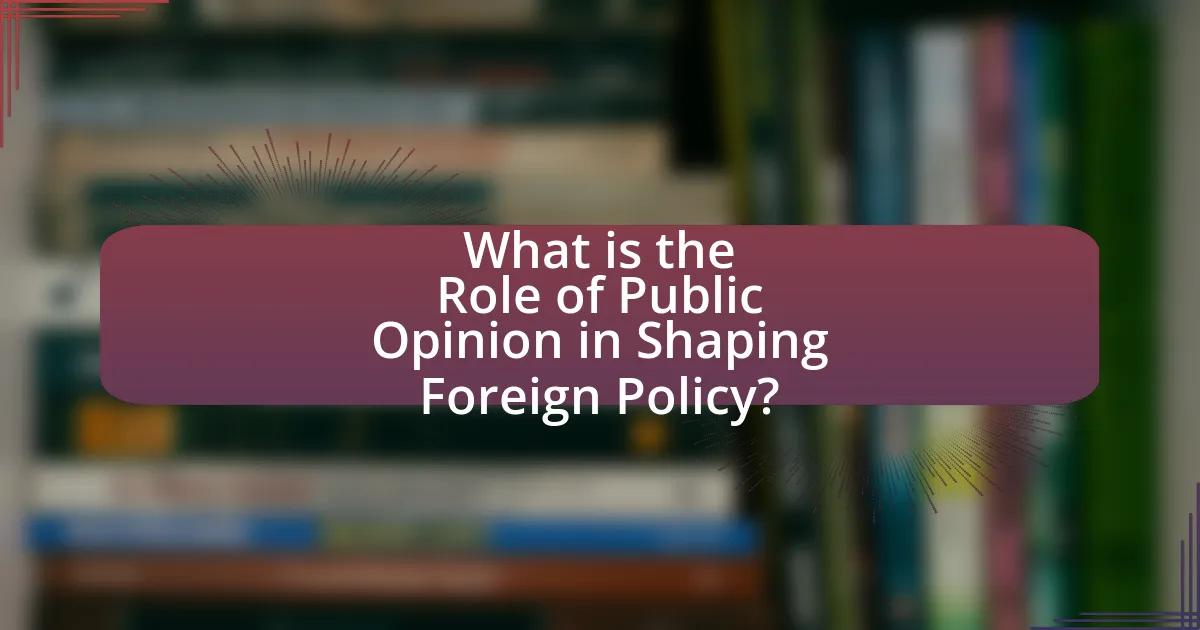
What is the Role of Public Opinion in Shaping Foreign Policy?
Public opinion plays a crucial role in shaping foreign policy by influencing government decisions and actions. Policymakers often consider public sentiment to maintain political support and legitimacy, as seen in democratic nations where elections can hinge on foreign policy issues. For example, the Vietnam War significantly impacted U.S. public opinion, leading to a shift in foreign policy as widespread protests and disapproval influenced government actions. Additionally, public opinion can drive policymakers to prioritize certain international issues, such as climate change or human rights, reflecting the values and concerns of the electorate. This dynamic illustrates how public sentiment can directly affect the direction and implementation of foreign policy initiatives.
How does public opinion influence government decisions in foreign policy?
Public opinion significantly influences government decisions in foreign policy by shaping the priorities and actions of political leaders. When a substantial portion of the population expresses strong views on international issues, elected officials often respond to these sentiments to maintain public support and ensure electoral success. For instance, during the Vietnam War, widespread anti-war protests and public disapproval led to a shift in U.S. foreign policy, culminating in the withdrawal of troops. Additionally, surveys and polls, such as those conducted by the Pew Research Center, consistently show that public attitudes toward foreign interventions can directly impact legislative decisions and diplomatic strategies. This demonstrates that government officials are attuned to the prevailing public mood, as it can affect their political capital and legitimacy.
What are the mechanisms through which public opinion is measured?
Public opinion is measured through various mechanisms, including surveys, polls, focus groups, and social media analysis. Surveys and polls, such as those conducted by Gallup or Pew Research Center, utilize structured questionnaires to gather quantitative data on public attitudes and beliefs. Focus groups involve guided discussions with selected participants to gain qualitative insights into public sentiment. Social media analysis leverages data mining techniques to assess public opinion trends based on user-generated content across platforms like Twitter and Facebook. These methods collectively provide a comprehensive understanding of public opinion, which is crucial for informing foreign policy decisions.
How do political leaders respond to shifts in public sentiment?
Political leaders respond to shifts in public sentiment by adjusting their policies, communication strategies, and political agendas to align with the evolving views of their constituents. For instance, during the Vietnam War, U.S. leaders, including President Lyndon B. Johnson, faced significant public opposition, which led to a gradual shift in military strategy and ultimately a withdrawal from the conflict. This response illustrates how leaders monitor public opinion through polls and media coverage, allowing them to make informed decisions that reflect the desires and concerns of the electorate.
Why is public opinion considered a critical factor in foreign policy formulation?
Public opinion is considered a critical factor in foreign policy formulation because it influences government decisions and actions on international issues. Policymakers often rely on public sentiment to gauge support for foreign initiatives, as demonstrated by historical events such as the Vietnam War, where widespread public opposition led to a reevaluation of U.S. military involvement. Additionally, studies show that democratic governments are more likely to align their foreign policies with the preferences of their citizens, as seen in the case of the Iraq War, where public disapproval significantly impacted political discourse and policy direction.
What historical examples illustrate the impact of public opinion on foreign policy?
Public opinion has significantly influenced foreign policy throughout history, with notable examples including the Vietnam War and the Iraq War. During the Vietnam War, widespread anti-war sentiment in the United States led to a shift in policy, culminating in the withdrawal of American troops in 1973. Public protests and media coverage played a crucial role in shaping perceptions of the war, ultimately pressuring the government to change its approach. Similarly, in the lead-up to the Iraq War in 2003, public opinion was initially supportive of military action based on claims of weapons of mass destruction. However, as the war progressed and casualties mounted, public support waned, leading to a reevaluation of U.S. involvement in the region. These examples demonstrate how public sentiment can directly impact governmental decisions regarding foreign policy.
How do public opinion polls affect diplomatic relations?
Public opinion polls significantly influence diplomatic relations by shaping government policies and international negotiations. When polls indicate strong public support or opposition to a particular foreign policy, governments often adjust their diplomatic strategies to align with public sentiment, as seen in the U.S. response to the Vietnam War, where declining public support led to a shift in policy. Additionally, leaders may use favorable poll results to justify diplomatic actions, enhancing their legitimacy on the global stage. This dynamic illustrates how public opinion can serve as both a constraint and a motivator in the realm of international relations.
What challenges does public opinion present to policymakers?
Public opinion presents significant challenges to policymakers by influencing decision-making processes and creating pressure for responsiveness. Policymakers often face the dilemma of balancing public sentiment with expert recommendations, which can lead to conflicts in prioritizing national interests versus popular demands. For instance, during the Vietnam War, public opposition significantly impacted U.S. foreign policy, leading to a withdrawal of troops as public protests escalated. This historical context illustrates how public opinion can compel policymakers to alter their strategies, sometimes resulting in decisions that may not align with long-term national security objectives.
How can misinformation affect public perception of foreign policy issues?
Misinformation can significantly distort public perception of foreign policy issues by creating misconceptions and influencing attitudes toward international relations. For instance, inaccurate narratives about a country’s actions can lead to public support for aggressive policies or military interventions based on false premises. A study by the Pew Research Center found that 64% of Americans believe misinformation has a major impact on their understanding of foreign affairs, highlighting the pervasive influence of misleading information. This distortion can result in polarized opinions, where citizens may support or oppose policies based on fabricated or exaggerated claims, ultimately shaping the political landscape and decision-making processes in foreign policy.
What role do media and social networks play in shaping public opinion?
Media and social networks significantly influence public opinion by providing platforms for information dissemination and facilitating discussions. These channels shape perceptions through the framing of news stories, the selection of topics, and the amplification of specific viewpoints. For instance, studies show that social media can create echo chambers, where users are exposed primarily to information that aligns with their existing beliefs, reinforcing those views and affecting public sentiment. According to a Pew Research Center study, 62% of Americans get news from social media, highlighting its role in shaping opinions on critical issues, including foreign policy.
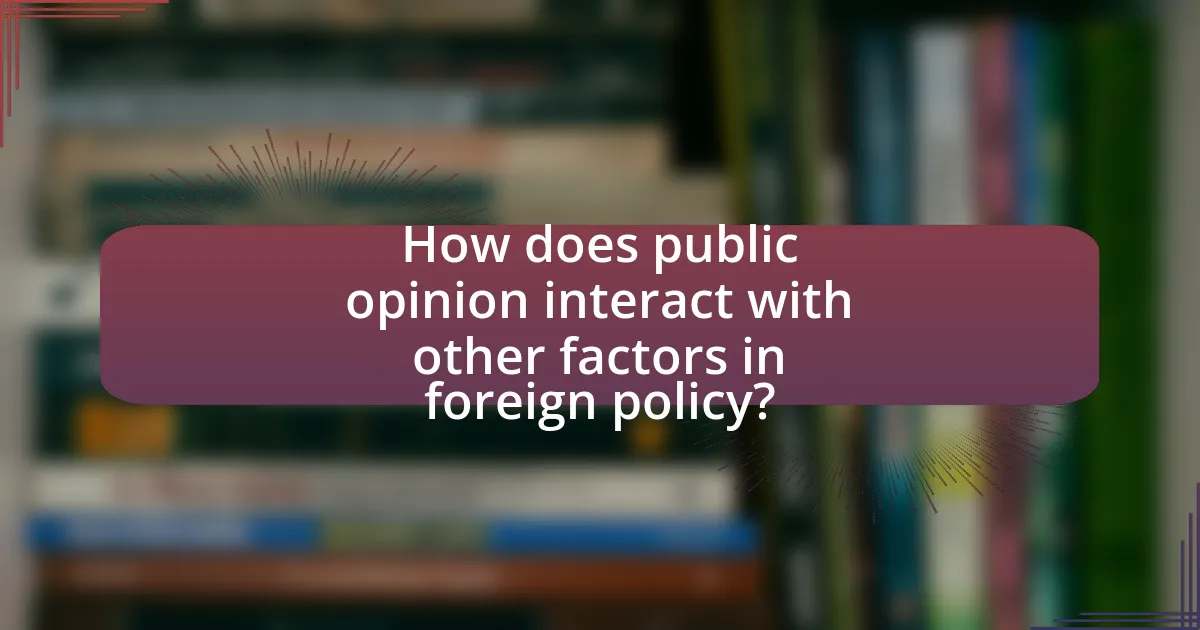
How does public opinion interact with other factors in foreign policy?
Public opinion significantly influences foreign policy by shaping the priorities and actions of government officials. When citizens express strong views on international issues, elected leaders often respond to these sentiments to maintain public support and ensure electoral success. For instance, during the Vietnam War, widespread anti-war sentiment led to a shift in U.S. foreign policy, culminating in the withdrawal of troops. Additionally, public opinion interacts with media coverage, which can amplify certain issues and sway public perception, further impacting policymakers. Research indicates that leaders are more likely to pursue policies aligned with public sentiment, especially in democratic societies, where public approval is crucial for political survival.
What are the relationships between public opinion and political ideology?
Public opinion and political ideology are closely interconnected, as public opinion often reflects the prevailing political ideologies within a society. Political ideology provides a framework through which individuals interpret political issues, and this interpretation shapes their opinions on various policies and actions. For instance, research indicates that individuals who identify with liberal ideologies tend to support government intervention in economic matters, while those with conservative ideologies often advocate for limited government involvement. This ideological alignment influences public opinion on foreign policy issues, such as military intervention or international trade agreements, where liberal perspectives may favor diplomacy and humanitarian aid, while conservative views may prioritize national security and military strength. Thus, the relationship between public opinion and political ideology is reciprocal; public opinion can reinforce existing ideologies, while shifts in public sentiment can lead to changes in political ideology over time.
How do partisan divides influence public opinion on foreign policy?
Partisan divides significantly influence public opinion on foreign policy by shaping individuals’ perceptions and attitudes based on their political affiliations. Research indicates that Democrats and Republicans often have starkly different views on issues such as military intervention, diplomacy, and international alliances. For instance, a 2021 Pew Research Center study found that 70% of Democrats favored diplomatic solutions to international conflicts, while only 40% of Republicans shared this view, highlighting a clear partisan divide. This divergence affects how foreign policy decisions are communicated and received by the public, as political leaders often tailor their messaging to align with the prevailing sentiments of their party’s base, further entrenching these divides.
What role does national security play in shaping public attitudes?
National security significantly influences public attitudes by creating a sense of urgency and concern regarding threats, which in turn shapes perceptions of government policies and actions. When citizens perceive a heightened threat to national security, they are more likely to support measures that prioritize safety, such as increased military spending or stricter immigration controls. For example, following the September 11 attacks in 2001, public support for national security measures surged, leading to the implementation of policies like the USA PATRIOT Act. This demonstrates how national security concerns can mobilize public opinion and drive policy changes in foreign affairs.
How do international events impact public opinion on foreign policy?
International events significantly shape public opinion on foreign policy by influencing perceptions, emotions, and attitudes toward global issues. For instance, events such as wars, humanitarian crises, or diplomatic breakthroughs can evoke strong emotional responses from the public, leading to increased support or opposition to specific foreign policies. A notable example is the public reaction to the September 11 attacks in 2001, which resulted in widespread support for military intervention in Afghanistan, reflecting a shift in public opinion driven by the perceived threat to national security. Additionally, studies show that media coverage of international events plays a crucial role in framing public understanding and sentiment, as seen during the Syrian refugee crisis, where images and narratives significantly affected public attitudes toward immigration policies.
What are the effects of crises on public support for foreign interventions?
Crises significantly increase public support for foreign interventions. During times of crisis, such as military conflicts or humanitarian disasters, public sentiment often shifts towards favoring government action abroad, driven by a perceived need for national security or moral obligation. For instance, following the September 11 attacks in 2001, public approval for military intervention in Afghanistan surged to approximately 90%, reflecting a strong desire for decisive action against perceived threats. This pattern is supported by research indicating that crises create a rally-around-the-flag effect, where citizens unite in support of their government’s foreign policy decisions.
How do global trends influence domestic public opinion?
Global trends significantly influence domestic public opinion by shaping perceptions, attitudes, and beliefs about international issues. For instance, the rise of social media has facilitated the rapid dissemination of information regarding global events, leading to increased awareness and engagement among citizens. Research indicates that during the COVID-19 pandemic, public opinion in many countries shifted in response to global health trends, with citizens advocating for stronger health policies and international cooperation. This demonstrates that as global issues gain prominence, they can directly affect how the public views their government’s actions and policies, ultimately impacting foreign policy decisions.
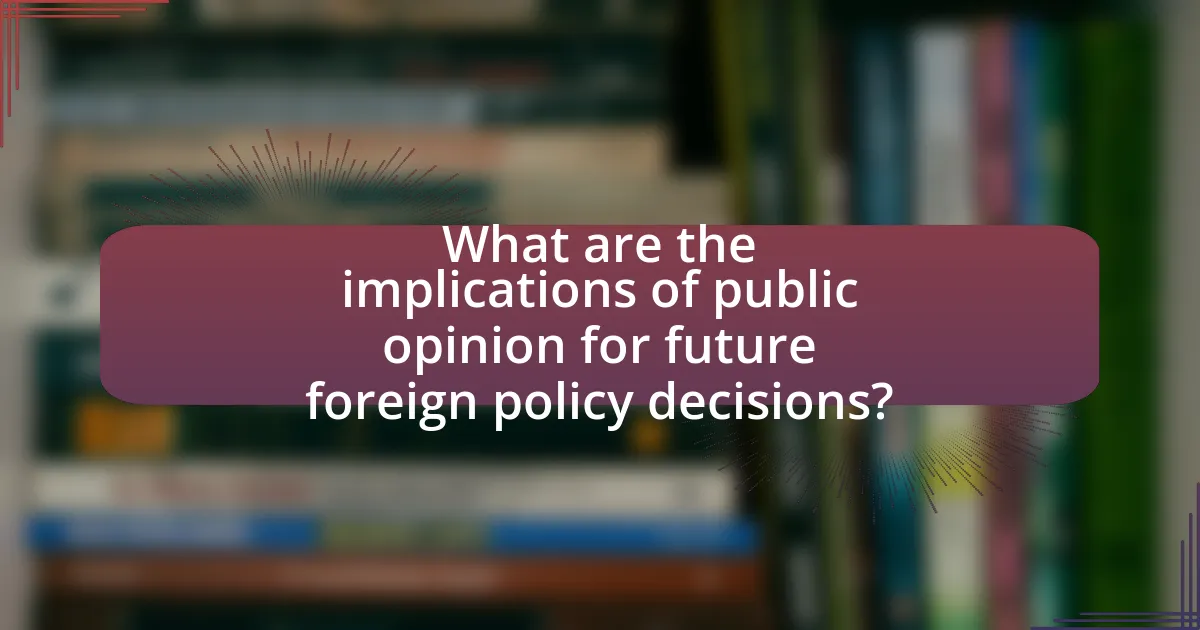
What are the implications of public opinion for future foreign policy decisions?
Public opinion significantly influences future foreign policy decisions by shaping the priorities and actions of policymakers. When a substantial portion of the public supports a particular stance, such as military intervention or diplomatic engagement, elected officials are more likely to align their policies with these views to maintain electoral support. For instance, the U.S. invasion of Iraq in 2003 was heavily influenced by public sentiment following the September 11 attacks, where initial support for military action was high. Conversely, when public opinion turns against a policy, as seen with the Vietnam War, it can lead to a reevaluation or withdrawal of military involvement. This dynamic illustrates that policymakers must consider public sentiment to ensure legitimacy and support for their foreign policy initiatives.
How can policymakers effectively engage with public opinion?
Policymakers can effectively engage with public opinion by utilizing transparent communication strategies and actively soliciting feedback through various channels. Engaging with public opinion involves conducting surveys, town hall meetings, and leveraging social media platforms to gauge citizen sentiments and preferences. For instance, a 2021 Pew Research Center study found that 70% of Americans believe that government officials should pay attention to public opinion when making policy decisions. This demonstrates that when policymakers prioritize public input, they can create policies that resonate with the electorate, thereby enhancing democratic legitimacy and fostering trust in government institutions.
What strategies can be employed to educate the public on foreign policy issues?
To educate the public on foreign policy issues, strategies such as utilizing social media campaigns, hosting public forums, and integrating foreign policy education into school curricula can be employed. Social media campaigns can effectively reach diverse audiences, as evidenced by the 2016 U.S. presidential election, where platforms like Twitter and Facebook played significant roles in shaping public discourse on foreign policy. Public forums allow for direct engagement between policymakers and citizens, fostering dialogue and understanding; for instance, town hall meetings have historically increased civic participation and awareness. Additionally, incorporating foreign policy topics into educational systems ensures that future generations are informed, as studies show that early education on global issues enhances critical thinking and civic engagement.
How can transparency in decision-making enhance public trust?
Transparency in decision-making enhances public trust by allowing citizens to understand the rationale behind policies and actions taken by authorities. When decision-makers openly share information, processes, and criteria used in their decisions, it reduces uncertainty and fosters a sense of accountability. Research indicates that transparency can lead to increased public engagement and support; for instance, a study by the World Bank found that transparent governance practices correlate with higher levels of citizen trust in government institutions. This trust is crucial in shaping public opinion, particularly in foreign policy, as it encourages collaboration and acceptance of governmental decisions.
What best practices should be followed to align foreign policy with public sentiment?
To align foreign policy with public sentiment, governments should prioritize transparent communication, engage in active public consultation, and utilize data-driven analysis of public opinion. Transparent communication ensures that citizens are informed about foreign policy decisions and their implications, fostering trust and understanding. Engaging in active public consultation, such as town hall meetings and surveys, allows policymakers to gather diverse perspectives and adapt policies accordingly. Data-driven analysis, including the use of opinion polls and social media sentiment analysis, provides concrete insights into public attitudes, enabling policymakers to make informed decisions that reflect the populace’s views. For instance, the U.S. government’s shift in foreign policy towards Cuba in 2014 was influenced by changing public sentiment favoring engagement over isolation, as evidenced by polling data showing increased support for diplomatic relations.
How can feedback mechanisms be established to gauge public opinion continuously?
Feedback mechanisms can be established to gauge public opinion continuously by implementing real-time surveys, social media analytics, and focus groups. Real-time surveys, such as online polls, allow for immediate collection of public sentiment on specific issues, providing instant feedback. Social media analytics tools can track public discussions and sentiment trends, offering insights into public opinion shifts over time. Focus groups can be conducted regularly to gather qualitative data on public attitudes and perceptions, ensuring a deeper understanding of the nuances in opinion. These methods collectively create a dynamic feedback loop that informs policymakers about public sentiment, enabling responsive foreign policy decisions.
What role do civic education and public discourse play in shaping informed opinions?
Civic education and public discourse are essential in shaping informed opinions by equipping individuals with the knowledge and skills necessary to engage critically with societal issues. Civic education provides foundational understanding of democratic principles, rights, and responsibilities, which fosters active participation in public life. For instance, studies show that individuals who receive civic education are more likely to vote and engage in community activities, thereby influencing public opinion. Public discourse, on the other hand, facilitates the exchange of diverse perspectives, allowing individuals to consider multiple viewpoints and develop well-rounded opinions. Research indicates that communities with robust public discourse tend to have higher levels of civic engagement and informed citizenry, which directly impacts policy decisions and foreign policy outcomes.
